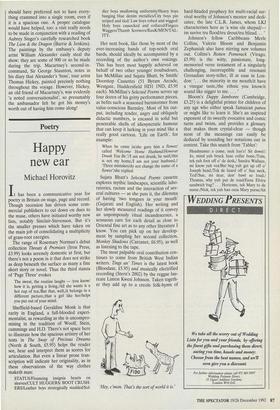Poetry
Happy new ear
Michael Horovitz
It has been a communicative year for poetry in Britain on stage, page and record. Though recession has driven some com- mercial publishers to cut down on dues to the muse, others have initiated worthy new lists, notably Sinclair-Stevenson. But it's the smaller presses which have taken on the main job of consolidating a multiplicity of grass-root energies. The range of Rosemary Norman's debut collection Threats & Promises (Iron Press, £3.99) looks serenely domestic at first, but there's not a poem in it that does not strike as deep beneath the surface as many a fine short story or novel. Thus the third stanza of 'Page Three' evokes
The sweat, the routine laughs — /you know/ how it is, getting a living./All she wants is a hot cup of tea./But that, well,/it belongs in a different picture,/that a girl like her/helps you put out of your mind.
Sheffield-based Geraldine Monk is that rarity in England, a full-blooded experi- mentalist, as rewarding as she is uncompro- mising in the tradition of Woolf, Stein, cummings and H.D. There's not space here to illustrate how the spacious artistry of her texts in The Sway of Precious Dreams (North & South, £5.95) helps the reader see, hear and interpret them as scores for articulation. But even a linear prose tran- scription will indicate her originality, as in these observations of the way clothes maketh man:
STATUS/Flouncing insignia hearts on sleeves/CULT HUGGERS/ BOOT CRUSH- ERS/Leather boys strategically studded/Sol- dier boys swallowing uniformity/Heavy boys banging blue denim metallics/City boys pin striped and tied/ Law boys robed and wigged/ Holy boys cassocked and collared/Fingers Waggers/Thumb Screwers/RanK/MEN/TAL- ITY.
Her next book, like those by most of the ever-increasing bands of top-notch oral bards, should ideally be accompanied by a recording of the author's own voicings. This has been most happily achieved on behalf of two other younger troubadours, Ian McMillan and Sujata Bhatt, by Smith/ Doorstop Cassettes (51 Byram Arcade, Westgate, Huddersfield HD1 1ND, £5.95 each). McMillan's Selected Poems serves up four dozen of his gritty performance pieces, as befits such a seasoned barnstormer from value-conscious Barnsley. Most of his out- put, including tender, angry and obliquely didactic numbers, is encased in solid but penetrable shells of idiosyncratic humour that can keep it lurking in your mind like a really good cartoon. 'Life on Earth', for example:
When he came in/she gave him a flower/ called 'Welcome Home Husband/However Drunk You Be:/II am not drunk, he said/this is not my homed! am not your husband.// 'Three mistakes/do not change the name of a flower'/she replied.
Sujata Bhatt's Selected Poems cassette explores mythic landscapes, scientific labo- ratories, racism and the interaction of sev- eral cultures — as she puts it, the dilemma of having 'two tongues in your mouth' (Gujarati and English). Her writing and her slowly measured readings of it convey an unpompously ritual incandescence, a sensuous care for each detail as close to Oriental fine art as to any other literature I know. You can pick up on her develop- ment by sampling her second collection, Monkey Shadows (Carcanet, £6.95), as well as listening to the tape.
The most palpable oral contribution con- tinues to come from British West Indian writers. Tings an' Times is the latest book (Bloodaxe, £5.95) and musically electrified recording (Stern's 2002) by the reggae lau- reate Linton Kwesi Johnson. Taken togeth- er they add up to a creole folk-hymn of 'Hey, c'mon. That's the sort of world it is.' hard-headed prophecy for multi-racial sur- vival worthy of Johnson's mentor and dedi- catee, the late C.L.R. James, whom LKJ characterises here as 'a wise ole shepad/— im suvive tru flood/tru drout/tru blizad. . . '
Johnson's fellow Caribbeans Merle Collins, Valerie Bloom and Benjamin Zephaniah also have stirring new volumes out. Collins's Rotten Pomerack (Virago, £5.99) is the witty, passionate, long- memoried verse testament of a singularly challenging, incorruptible and resonant Grenadian story-teller, ill at ease in Lon- don: `. . . the minority in me mouth/it have a vinegar taste,/the ethnic you know/it sound like nigger to me. . . . '
Bloom's Duppy Jamboree (Cambridge, £3.25) is a delightful primer for children of any age who either speak Jamaican patwa or might like to learn it. She's an inspired exponent of its sweetly evocative and comic turns and twists, and provides a glossary that makes them crystal-clear — though most of the meanings can easily be deduced by sounding her notations out in context. Take this snatch from 'Tables':
Headmaster a come, mek has'e! Sit down!/ Jo, mind yuh bnick Jane collar bone./Tom, tek yuh foot off o' de desk,/ Sandra Wallace, mi know yuh vex/But beg yuh get up off o' Joseph head./Tek de lizard off o' Sue neck, Ted!/Sue, mi dear, don' bawl so loud./ Thomas, why yuh put de toad/Eena Elvira sandwich bag? . . . Hortense, tek Mary to de nurse./Nick, tek yuh han outa Mary purse/Ah
wonda who tell all o' yuh/Sey dat dis class- room is a zoo?/Quick! Headmaster comin' tru de door./ Two ones are two, two twos are four'.
Zephaniah's City Psalms (Bloodaxe, £5.95) richly displays this Rasta rhymester's knack of transforming almost any topic into a bubbling brew of verbal rum punch. 'Royals do it too' is typical:
De Press has gone krazzy/De message is blur ... A royal divorce, a royal divorce/I got de facts from a well unknown source ... She was so busy/Never at home,/He's in de Navy/ De kids are alone ... De Family vex/It's all over de place/Nu more royal sex/It's a royal disgrace/A royal disgrace, I followed de case/It's thrilling an killing/An all in good taste....
But be warned: although, as another, more technical composition says,
'Dis poetry is not afraid of going ma book/ Still dis poetry need ears fe hear an eyes fe hay a look/Dis poetry is Verbal Riddim, no big words involved/An if I hay a problem de riddim gets it solved' ...
If the 'dub ranting' idiom is unfamiliar to you, turn first to Benjamin's exuberant recordings, or get to one of his frequent larger-than-life live gigs, so that taking in the total sound of these chants will come naturally after a while. Then, with luck, you'll concur with the chickens of imperial- ism come home not only to roost but to rejoice — and renew the building of Jerusalem, even.
Each of these poets can also be perused, along with 32 others, in the 400-page anthology Grandchildren of Albion: Voices & Visions of Younger Poets in Britain (£10.99 from New Departures, Piedmont, Bisley, Glos GL6 7BU). Everyone who smiles their work to see is guaranteed a merry egg-mass and a happy new ear.











































































































 Previous page
Previous page